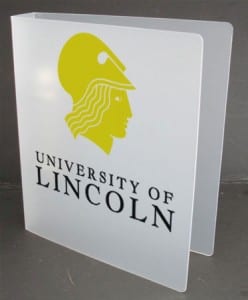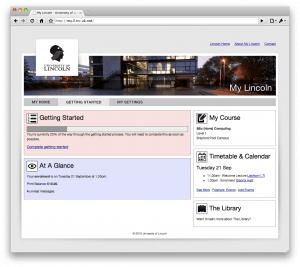The University of Lincoln is currently doing really well in terms of improving its standing in the NSS, which measures student satisfaction. It’s doing this by focussing a fair bit (although not as much as I’d like) of its energies on the student experience.
At the beginning of this year I spent induction week mostly watching what was going on, how students behaved, and what went wrong. I came up with a report on induction problems which spanned 4 sides of A4, detailing everything from confusion over what a student’s email address was through to the fact that people were told to fully update their laptop before they came to university by a flyer on their bed when they arrived (oops). However, this blog post isn’t about trying to fix those problems or assign blame to any one group (if that’s even possible). Instead it’s about trying to change how we handle bits of induction so that those problems simply don’t exist. Let’s get going.
Make Awesome Induction Material

One cause of a lot of problems was the sheer volume and variety of printed material that students were given in their induction manual, nicely wrapped up in a folder which had “This folder is full of important information. Don’t say we didn’t tell you!” printed on a bit of paper visible through the side. Quite apart from being condescending to the new students (I overheard more than one student commenting on “being treated like children”) the effect was akin to picking up a Sunday newspaper and watching 14 different supplements fall out. Students were given a University handbook, a copy of the University regulations, an SU handbook, the IT Handy Guide, a bit about the Library, a bit of paper telling them where to find their induction timetable, a schedule of SU events, a map of the campus, and probably a free pen as well. All useful, but ultimately disorganised and hard to find what you’re looking for.
Here’s what I propose. Every student should be given an A5 polypropylene ring binder printed with the University logo. The contents of this folder would be much the same as the current induction material, just collated, formatted, edited, typeset and properly published and printed on reasonable weight paper by a central body. This does have the slightly unwanted side effect of imposing a deadline by which to get induction material produced, but it’s necessary if the University wants to provide a solid experience. This material is neatly split into sections using properly printed tabs (also on polypropylene for added toughness, and because it will look great) so that a student can find what they’re looking for easily. This is where it gets awesome.
Ring binders can have extra information added to them very easily. This means that each student’s folder can have a section titled ‘My Course’, which will have material directly relevant to them such as induction timetables! Similarly we can add material to deal with ‘exception’ students such as mature or international, and – the pièce de résistance – a personalised page with their ID number, email address, name and contact details of their subject librarian and course co-ordinator and so on. Signing in is easier, getting in touch with course specific support is easier. Everyone wins, except for the people who expected to be able to add their material to the enrolment pack the weekend before students arrived.

